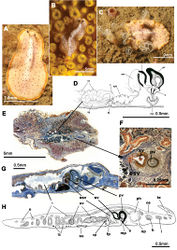Prostheceraeus moseleyi
| Notice: | This page is derived from the original publication listed below, whose author(s) should always be credited. Further contributors may edit and improve the content of this page and, consequently, need to be credited as well (see page history). Any assessment of factual correctness requires a careful review of the original article as well as of subsequent contributions.
If you are uncertain whether your planned contribution is correct or not, we suggest that you use the associated discussion page instead of editing the page directly. This page should be cited as follows (rationale):
Citation formats to copy and paste
BibTeX: @article{Noreña2014ZooKeys404, RIS/ Endnote: TY - JOUR Wikipedia/ Citizendium: <ref name="Noreña2014ZooKeys404">{{Citation See also the citation download page at the journal. |
Ordo: Polycladida
Familia: Euryleptidae
Genus: Prostheceraeus
Name
Prostheceraeus moseleyi Lang, 1884 – Wikispecies link – Pensoft Profile
Material examined
Two specimens captured during the spring of 2010 (07/06/2010). Vouchers: one specimen sectioned sagittally, stained with Azan and deposited in the Invertebrate Collections of the MNCN: Cat. Nr: MNCN 4.01/663 to 4.01/688 (26 slides); one specimen sectioned sagittally, stained with Azan and deposited in the Invertebrate Collections of the MNCN: Cat. Nr: MNCN 4.01/689 to 4.01/731 (43 slides).
Description
Elongated worms 1–1.5 cm long and 0.5–0.7 mm wide (Figure 5A, B, C). Body shape elongated, wider at the posterior end, with light undulating margins and rounded anterior and posterior ends. Marginal tentacles with characteristic purple pigment. Dorsal surface smooth. Dorsal colouration whitish or yellowish, with dark, rounded spots and a yellow band along the body margin; at times background pigmentation faintly orange or pinkish (Figure 5A, B). Ventral side smooth and pale. Sucker approximately in middle of body. Tentacular eyes scarce and scattered over tentacles; cerebral eyes inconspicuous, in two elongated rows. Plicate cylindrical or tubular pharynx near anterior end, oriented frontally; oral pore behind brain. Male and female genital pores clearly separated and behind pharynx (Figure 5H). Male copulatory apparatus perpendicular to male pore (Figure 5D, G, H). Male system consists of a short penis papilla, armed with a small conical stylet, a true prostatic vesicle with a smooth glandular epithelium, and a seminal vesicle with a thick muscle layer. Vasa deferentia, sometimes very dilated, join an expanded vas deferens (possibly an external seminal vesicle; Figure 5F, G) before opening directly into true seminal vesicle. Prostatic vesicle opens at tip of penis papilla and seminal vesicle opens through a duct into distal end of prostatic vesicle.
Female system (Figure 5D, E) lies posterior to male pore and is characterized by a short, rounded female atrium, a cement duct or pouch, followed by a second dilatation of atrium and a posteriorly-orientated vagina. Cement and shell glands empty into cement duct.
Biology
Prostheceraeus moseleyi feeds mainly on Clavelina lepadiformis (Ascidiacea) (Figure 5B, C).
Remarks
Faubel (1984)[1] considers Prostheceraeus moseleyi as a species incertae sedis because in the original description by Lang (1884)[2] the uterine vesicles were not mentioned. In our specimens, multiple uterine vesicles (Figure 5D, E) run along both sides of the main body axis and therefore, Prostheceraeus moseleyi can now be considered as a valid species of the genus Prostheceraeus.
Distribution
Specimens of Prostheceraeus moseleyi were collected from the bottom of the pier at the Yacht Club Ribeira (Ria de Arosa, Galicia, Spain) at a depth of 5 to 10 metres (42°33.7410N, 008°59.3380W). This species was recorded from Italy (Gulf of Naples, Lang 1884[2]) and Spain (in several localities of the coast of Catalonia, Novell 2003[3]). Our sample represents the first record for the Atlantic coast and outside from the Mediterranean Sea.
Taxon Treatment
- Noreña, C; Marquina, D; Perez, J; Almon, B; 2014: First records of Cotylea (Polycladida, Platyhelminthes) for the Atlantic coast of the Iberian Peninsula ZooKeys, 404: 1-22. doi
Other References
- ↑ Faubel A (1984) The Polycladida, Turbellaria; Proposal and establishment of a new system. Part II. The Cotylea. Mitteilungen aus dem Hamburgischen Zoologischen Museum und Institut 81: 189-259.
- ↑ 2.0 2.1 Lang A (1884) Die Polycladen (Seeplanarien) des Golfes von Neapel und der angrenzenden Meeresabschnitte. Eine Monographie. Fauna und Flora des Golfes von Neapel und der angrenzenden Meeresabschnitte, herausgegeben von der Zoologische Station in Neapel. Engelmann, Leipzig.
- ↑ Novell C (2003) Tesis doctoral: Contribució al coneixement dels turbellaris policlàdides del litoral català. http://hdl.handle.net/10803/781
Images
|
